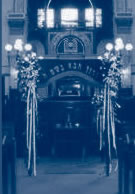|
SEDRA : KI TISSA Shabbat Parah: Hertz Chumash
p. 352 Exodus Ch. 30 v. 11
This week's Sedra is generously sponsored by Hendrik Zimmet
SYNOPSIS
The law of the HALF SHEKEL to be given by each man aged over
20 as a means of giving a "ransom of his soul to the
Lord" is introduced. It also is used as a means of counting
the people. i.e. a census. The silver of the shekels was melted
down and used as the bases for the pillars of the Sanctuary.
In later times the half Shekels would be used to finance the
maintenance of the Sanctuary and the purchase of animals for
the communal offerings thus ensuring universal participation
in its upkeep and services.
Moses is then commanded to make a LAVER for the preparing
of the hands and feet of the Priests (Cohanim) before commencing
their daily duties. Laving (netillat yadaim) on rising in
the morning, before eating and for Cohanim before the Priestly
benediction trace their origin to this practise. Details of
the preparation of the oil for anointing and for consecrating
the Sanctuary and the Cohanim are set out. The recipe for
preparing the incense is recorded.
The Chief of Artizans BEZALEL and OHOLIAV, men wisehearted
and imbued by the spirit of G-d, are entrusted with the duty
of building all the requirements of the Sanctuary.
Despite the profound importance and urgency of the building
of the Sanctuary, no construction "MELACHAH" is
to take place on Shabbat. This prohibition concludes with
the "Veshamroo" passage (Siddur p. 154) which has
become part of the Friday evening service and Kiddush on Shabbat
mornings. The activities forbidden in constructing the Sanctuary
on Shabbat are the source for defining those activities which
may not be performed on Shabbat in general.
The narrative then continues. Moshe has been on Mt Sinai
for 40 days and the people, fearing his disappearance, clamour
for a visible object of worship. Aharon attempts to delay
the people, but eventually creates the golden image of a calf
which the people begin to worship.
This heresy provokes G-d's wrath and Moses is sent down to
destroy the people. Moses intercedes and pleads for the people
to be spared. On descending the mountain Moses shatters the
Tablets of the Law. This day, the 17th of Tamuz, remains the
anniversary of this and other tragic events throughout Jewish
history.
Moses guides the people to repentance. He prepares a new set
of Stone Tablets for the Law and later again ascends Mt Sinai
and the Covenant with the Israelites is renewed. Moses' return
after 40 days (on Yom Kippur) is considered as a sign that
G-d has forgiven the people as Moses had asked.
SPECIAL MAPHTIR - (The red heifer) HERTZ CHUMASH P. 652 Numbers
Chap. 19 This is the third of the four special Shabbatot leading
up to Pesach. It refers to the purification of those who had
come into contact with death. Such contact rendered a person
TAMEH (ritually `impure') and precluded their entry into the
Sanctuary or Temple.
The purification ritual climaxed with the sprinkling of water
mixed with the ashes of a red heifer over the candidate for
purification. Once TAHOR (ritually pure) again, entry to the
Temple was permissible. The "Pesach connection"
- since the entire nation was expected to partake of the Paschal
Lamb, which was a Temple ritual, it was necessary for all
who had become TAMEH to be purified before Pesach.
THE HAPHTORAH HERTZ CHUMASH P. 999 Ezeckiel Ch. 36, verses
16 - 38 The theme of the haphtorah relates to the special
maphtir in that they both deal with the subject of purification.
"How Israel is to emerge from the grave of Exile, to
undefiled service of G-d".(Hertz)
TELL ME RABBI .... THE LANGUAGE OF MARRIAGE
"Behold, you are consecrated to me with this ring according
to the law of Moses and Israel".
These words, together with giving a ring, consecrate a man
and woman in marriage.
HARAY - BEHOLD
Hineni - here I am. "Whom shall I send .... and I said,
Hineni - behold, here I am!"(Is 6:8). This readiness
to undertake a mission in the words of Isaiah and in thre
tradition of Abraham implies the person has thought about
his intended involvement, and is ready to act according to
his commitment. In Aramaic "haray ani" - behold
I am - as Rabbi Elazar ben Azariah, appointed to a distinguished
position declares, "Behold I am (haray ani) like any
one 70 years old"(Brachot) - I am ready for the position.
Marriage too requires a mature considered decision and an
understanding of all the implications, obligations, its sanctity
and seriousness.
AT - YOU
The groom resolves to himself that marriage is to his wife.
This may seem superfluous but in time, some husbands become
'married' to their professions, rationalising that parnassah
- livelihood - is all-important and "for the sake of
the family", the husband puts his work before his wife.
But in marriage the wife must always be queen, his primary
obligation.
MEKUDESHET - HALLOWED (CONSECRATED)
When a woman is married, Mekudeshet, she becomes "holy"
in the sense that she is "separated" from other
men and consecrated to her husband. Marriage is holy and its
intimacy is raised to a spirit of holiness.
LI - TO ME
The wife too must constantly remember that she accepted marriage
to her husband. He is her first and foremost care and duty.
The careers of both husband and wife are important, but not
at the expense of their family and marriage.
BETABA'AT ZO - WITH THIS RING
A plain ring without a stone ensures that the identity of
the object and its value is known so that a woman does not
enter into a mistaken transaction which might invalidate the
marriage. The ring is round, without end, as marriage should
be forever.
KEDAT - ACCORDING TO THE LAW
Marriage is not a hit and miss affair. In modern times society
continually formulates new approaches to the institution of
marriage. Pre-marital sex, try out periods, newspaper columns,
and magazines serve as our guides. The Jewish people are fortunate
to have a Torah which directs this most important of all institutions,
the most intimate of relationships.
MOSHE VE"YISRAEL - OF MOSES AND ISRAEL
This Torah received through Moses in the presence of all Israel
is our eternal guide. There is no substitute.
TELL ME RABBI ..... GRACE AFTER MEALS
Part B THE BLESSING OF GOODNESS: BIRKAT HATOV V'HAMETIV
(Siddur p. 381)
The fourth blessing was prescribed by the Mishnah "soon
after the destruction of the Temple" circa 70 c.e. (Maimonides)
The post-Temple period was marked by deep despair. A Grace
thanking G-d for the "good land" that now was laid
waste and for Jerusalem and the Temple destroyed only increased
the anguish The sages therefore deliberately stressed the
goodness of G-d who is bound to bring redemption.
Later, following Bar Kokhba's uprising against the Romans,
the Emperor, Hadrian, punished the Jews by refusing to permit
their dead at Betar to be buried. Hadrian's successor, revoked
the edict. Miraculously, the bodies of the fallen had not
decayed. The sages at Yavneh saw it as a sign that Israel
though defeated, will be preserved and later restored to glory.
They expanded and applied the fourth blessing to this event:
"G-d is good" for preventing the decay of the corpses,
and "He does good" in making it possible to bring
them to burial "He will do good to us" is for the
future.(Berakhot 48b).
The end of the fourth blessing returns to the theme of food
and sustenance. It concludes with the words l'olam al yechasrenu,
"may we never lack"
THE CONCLUDING HARACHAMAN PETITIONS
The Grace continues with a customary series of short petitions
not part of the obligatory after-meal blessing. Some are personal,
some national each beginning with Harahaman ("May the
Merciful One ...").
On special occasions these petitions are expanded, e.g. in
the presence of a bride and groom, or at a meal celebrating
a Brit Milah. The Harahaman petitions conclude with a petition
for Peace, Oseh Shalom Bimromav...."
THE GUESTS'S PRAYER
A guest should be given the privilege of leading the Grace
so that he may bless the host (Talmud). The text is said as
a prayer in general terms: "May the Merciful One bless
the host and hostess and all who are seated about the table
... just as our forefathers were blessed in every way with
every manner of blessing."
BACK TO SHABBAT SHALOM
TABLE
|








